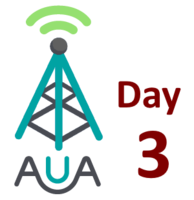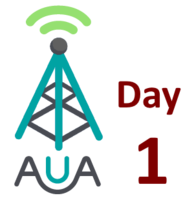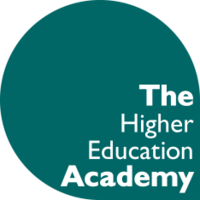Technical Community Event
26 Feb 2009Today the Academy York office hosted an event for the Academy’s technical community. Staff with ICT interests from York were joined by a range of like minded colleagues from the Academy Subject Centres and some guest speakers from outside of the community - around thirty in total.
The day began with a brief summary of points from each area. This is a regular starter for these bi-annual gatherings and there were over a dozen updates on various web site updates, new technology implementations and practices.
This was then followed by a presentation from one of the guest presenters from outside of the Academy technical community - Dominic Watts from Microsoft. Dominic is the Business Manager for Higher Education and he gave an overview of SharePoint and its features more specifically Microsoft Office SharePoint Server (MOSS) and its implementation within Microsoft itself. Various customised implementations for other institutions (including a number of Higher Education ones) were also shown though I think the real insight came from the Microsoft in-house implementation as that gave a view from the side of a collaborative user rather than a relatively passive web browser.
This lead nicely into a demonstration of Microsoft Office Communications Server (MOCS) by James Cummings - a member of the York ICT team. With assistance from Paul Hayward (another member of the York ICT team) an overview of the communications benefits of the system was presented live using the ICT teams (relatively) new virtualised development environment. Dominic was also able to support this presentation and identified that multiple sites running Microsoft Exchange could support a federated set-up allowing presence identifiers (i.e. do not disturb, busy, available - status) to be used outside of an organisation.
This was followed by Martin Poulter of Economics presenting on some of the tools and lessons learned from his more recent forays into the use of RSS news feeds. There were a number of tools such as Yahoo Pipes and xFruits that were demonstrated to show how feeds could be filtered and aggregated and the underlying message was that we could make the feeds work for the Academy (both for the public & media as well as internally) and that agreeing on a standard (RSS 2.0) including publishing date would be a logical step in bringing things in line.
A quick update from Mike Clarke (York) on an internal Academy collaboration project was followed by a chance for interpersonal networking over a spot of lunch.
The afternoon sessions kicked off with a review from Sarah Heaton (York) on the project relating to EvidenceNet (formerly the Research Observatory). The focus here was very much on bringing everyone up to speed on the phased nature of the work and setting up the type of support required from the Subject Centres and how they could be engaged for the second phase in the future.
The second post lunch presentation was given by staff from Jorum. The presentation was opened by Nicola Siminson (Community Enhancement Officer) and was generally an overview of the service. Funded by JISC it is a free online service for staff in UK universities and colleges that allows them to share e-learning/teaching resources. There was a significant amount of time given to explaining how Jorum is adopting a three tier access system.
- Jorum Open will give clear access to resources covered by a Creative Commons licence.
- Jorum Education UK will ensure that resources marked for this level are only available to UK FE & HE institutions as access is provided through a system of federated access management.
- Jorum Plus is the most restricted access level and is reserved for resources that are specially licensed (e.g. JISC collections). For this level of access additional institutional authorisation is required.
Matt Ramirez (Training & Support Officer) then picked up the presentation and talked through some of the latest work carried out on Jorum and specifically the Jorum Search Tool. The big change seemed to be in the speed of the system as the open source search server Apache Solr is now being used as a cache. Further developments are in the pipeline so everyone will probably be keeping an eye on this.
A brief coffee break later and Martin Poulter was back to the PowerPoint this time giving an insight into his recent experiences with Wikipedia. After covering off several acronyms Martin showed how several Wikipedia pages were driving traffic to the Economics Subject Centre web site. The odd thing seemed to be that in order to produce this it was actually done through not setting up the pages himself. Rather he made ‘specific’ and open contributions as someone with a vested interest at the same time as building up his Wikipedia user profile as a considerate updater who was contributing to the content of Wikipedia in a variety of ways - particularly in managing Wikipedia vandalism.
Wikipedia certainly seems like an area where knowing the territory and community is the key to your own success outside of it. It may well be something I’ll explore more deeply at a later date.
John McNaught of the National Centre for Text Mining gave an interesting presentation on … text mining. By using a range of tools (/services) based on natural language processing and significant computing power, text mining analyses large quantities of textual information and attempts to find key words, phrases and even context to allow a user to focus searches, and even potentially develop new hypotheses. There could well be areas in which to exploit some of the search tools to narrow and contextualise subject/discipline searches as well as even potentially help automatically identify appropriate key words as the basis for meta tagging for repositories like Jorum and EvidenceNet.
The final presentation came from Paul Harding of York’s Online Services Team. Paul gave a brief update on the current scale of the Academy’s public facing web site and a view of some of the upcoming sub-sites that were currently in development and that would be appearing in the coming weeks and months.
There were also a few areas where new functionality had been introduced, mainly around RSS feeds (both incoming and outgoing), but also some integration with micro-blogging and social networking sites. Thematic searching was also something that was coming to the fore and a rating system is felt to be progressing such that it should be deployed in the not too distant future.
Overall this seemed to be the most well attended and agenda packed Academy technical gathering I’ve been to, and I think everyone came away with plenty to think about.
 Scroll the menu to find all the places to visit
Scroll the menu to find all the places to visit


